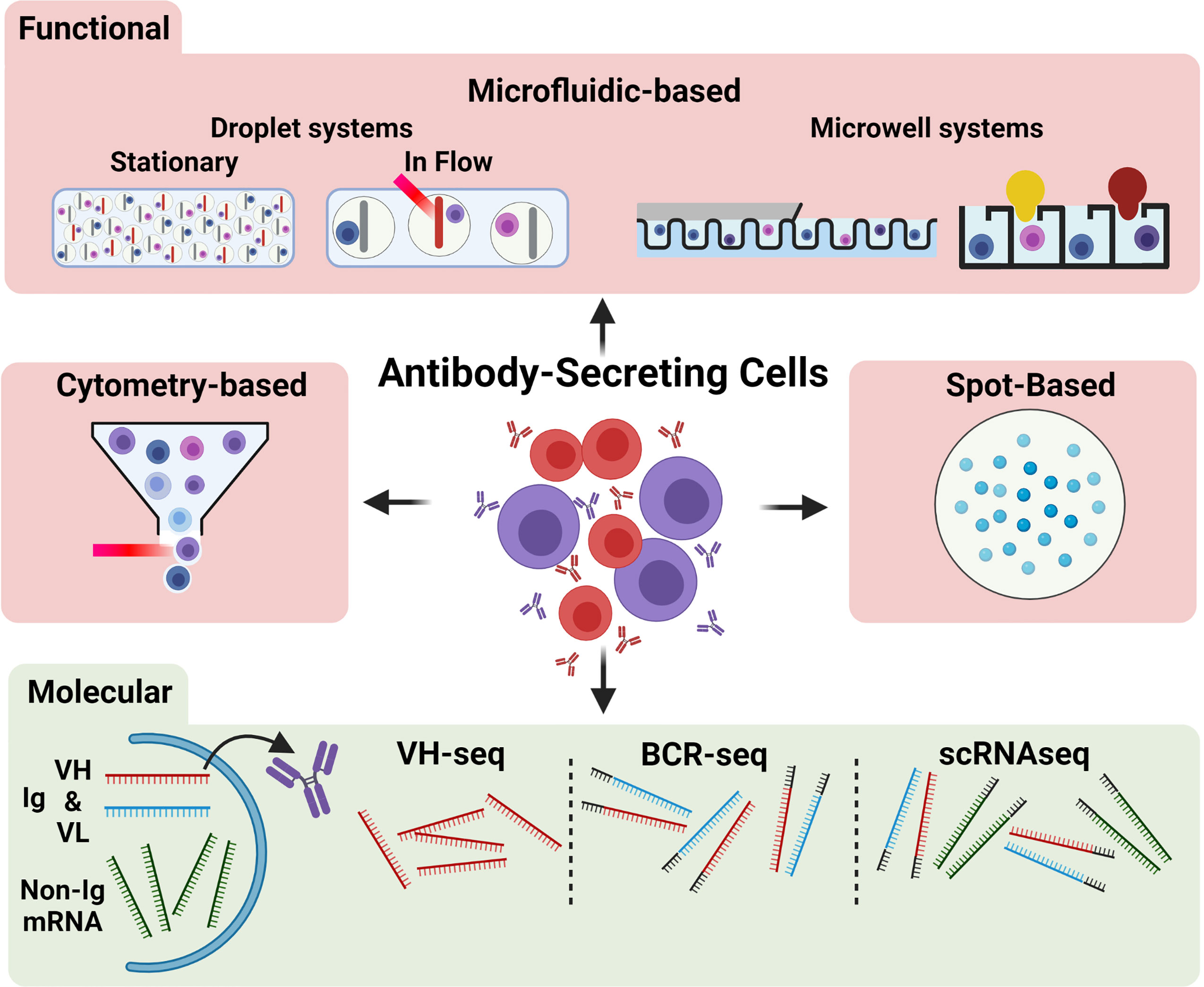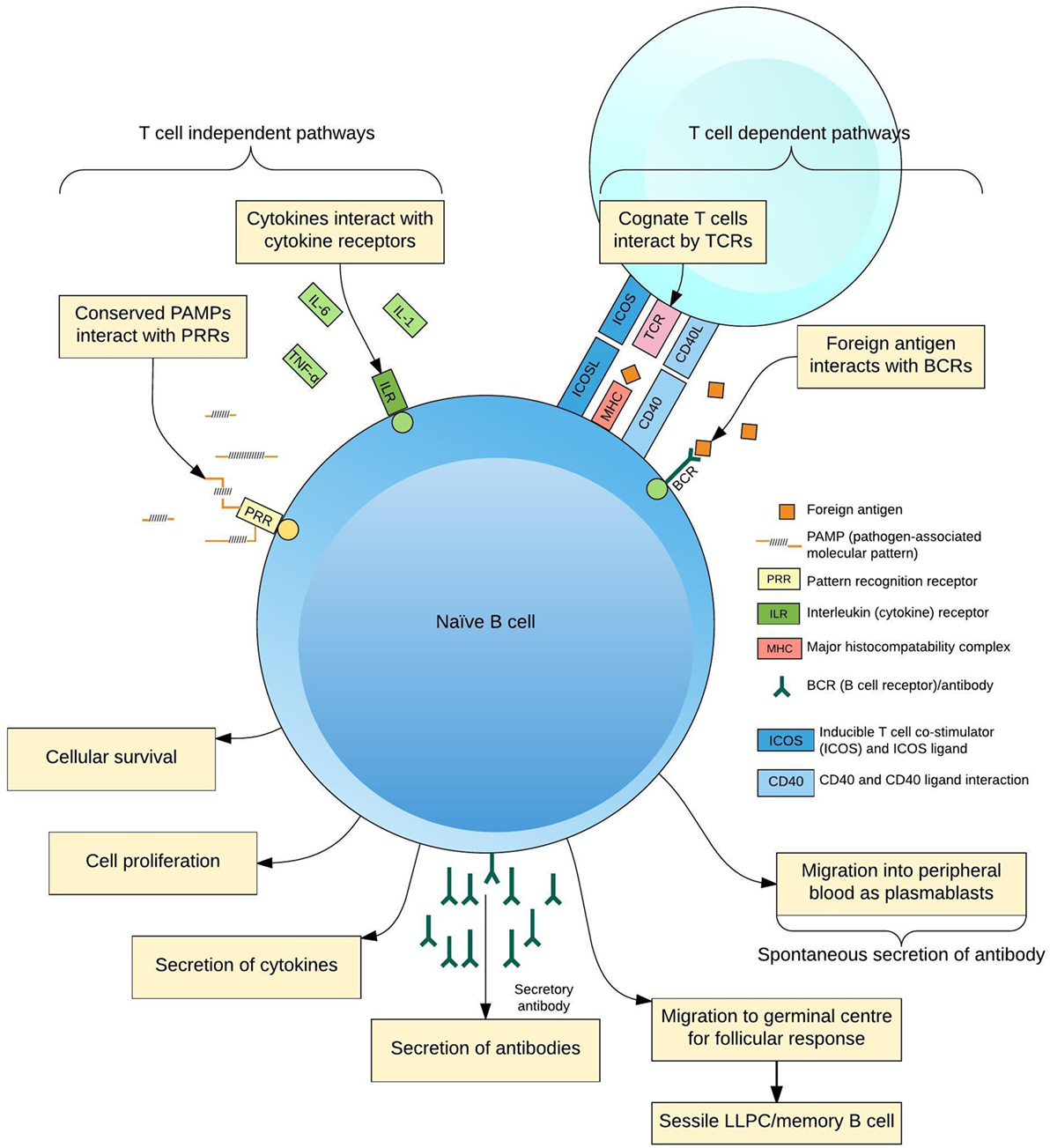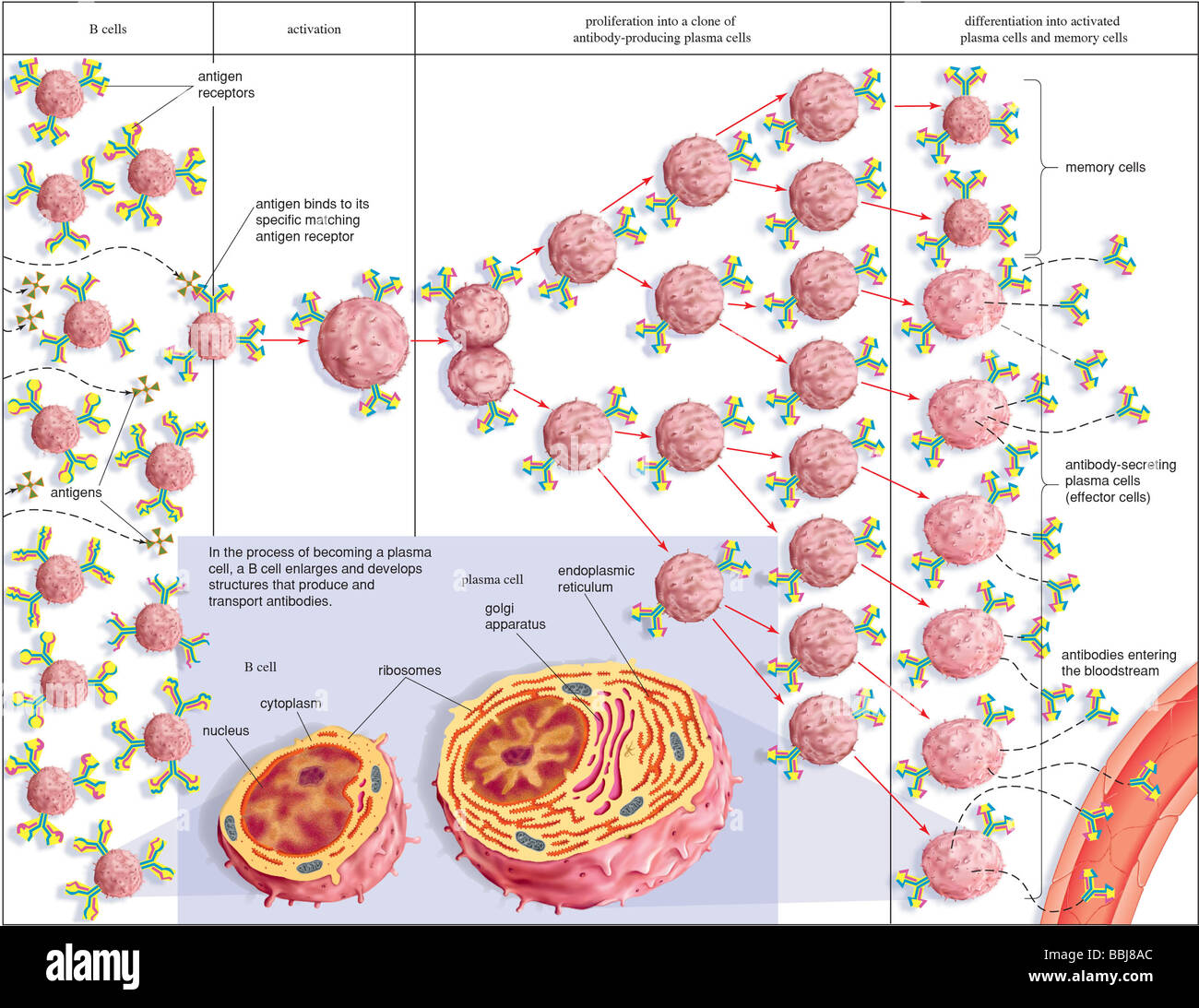Antibody Secreting Cells – Single-Cell Technologies for the Study of Antibody-Secreting Cells
Di: Luke
Such cells make and secrete large amounts of soluble (rather than membrane -bound) antibody, which has the same unique antigen-binding site as the cell-surface antibody that served earlier as the .Antibody-secreting cells (ASCs) are a specialized cell type that represents the end-stage of the B-cell differentiation program.Antibody-secreting cells (ASCs) represent the main effector B cells in protective responses and in pathogenic conditions that include autoimmunity, allergy and transplantation.Antibody secreting cells are critically dependent on integrin α4β7/MAdCAM-1 for intestinal recruitment and control of the microbiota during chronic .Antibody Secreting Cell – an overview | ScienceDirect Topicssciencedirect. This developmental process also provides immunity against re-exposure with the same infectious agent, through the .Plasma cells (PCs) produce antibodies that mediate immunity after infection or vaccination.Antibody-secreting cells are essential contributors to the humoral response.We describe here the derivation of a number of tissue culture cell lines which secrete anti-sheep red blood cell (SRBC) antibodies.An antigen-specific chimeric autoantibody receptor NK cell strategy for the elimination of anti-PLA2R1 and anti-THSD7A antibody-secreting cells Kidney Int .To address this, we developed the Spec-seq framework, which allows for simultaneous monoclonal antibody (mAb) characterization and transcriptional profiling from the same single cell.Here, we report that CD11c + B cells are a distinct subpopulation of B cells, enriched in the memory subpopulation even if their phenotype is heterogeneous, with overexpression of genes involved in B-cell activation and differentiation as well as in antigen presentation. Numbers in plots represent percentages within the immediate parent population.Using mouse hybridoma cells antibody secretion assay is completed in 30 min.Antibody secreting cells (ASCs) are terminally differentiated cells of the humoral immune response and must adapt morphologically, transcriptionally, and metabolically to maintain high-rates of antibody (Ab) secretion. Furthermore, antigen‐specific immune responses were investigated in vaccine studies using flow cytometry . To address the status of humoral immunity during KD, our current concentration is on the variations of ASCs and memory B cells, as well .antibody-secreting cells. Antibody-secreting cells (ASC) are B cells that have differentiated following activation to secrete various soluble isotypes of their immunoglobulin receptor with the purpose of binding their target antigen throughout the body (). ASCs differentiate from activated B cells in lymph nodes and transiently circulat . Upon activation, CD11c + B cells can differentiate into antibody-secreting . The regulation of antibody production is linked to the generation and maintenance of plasmablasts and plasma cells from their B cell precursors.comEmpfohlen auf der Grundlage der beliebten • Feedback Upon stimulation, B cells assume heterogeneous cell fates, with only a fraction differentiating .Full Size Table FRET-based droplet sorting enables over 800-fold enrichment in one round of sorting. Accordingly, cytometry‐based methods not only enable basic research but . The cell lines are made by fusion . It was first developed by Manz et al. In a healthy state, ASCs are widely .

Antibody-secreting plasma cells (PCs) are generated in secondary lymphoid organs but are reported to reside in an emerging range of anatomical sites. In this review, we discuss the current knowledge of the heterogeneity of ASCs infiltrating solid tumors .
Plasma cells: The programming of an antibody-secreting machine
The data suggest that a single dose of the IM bivalent norovirus vaccine is effective in activating pre-existing B cell memory. ASCs (plasmablasts) have been extensively studied in humans, but . The traditional method to monitor a humoral .
B Cells and Antibodies
To date, limit studies have focused on the two populations in Kawasaki disease (KD). Here the authors .Antigen-specific B cells bifurcate into antibody-secreting cells (ASCs) and memory B cells (MBCs) after infection or vaccination. Cells pre-gated on total singlets.Nature Biotechnology – Millions of primary IgG-secreting cells from mouse and human are characterized for activity and antibody sequence at the single-cell level. 2024 Feb 2:S0085-2538(24)00080-2. Mature nondiving PCs originate from an antigen-activated B cell through various stages of antibody-secreting cells. The production of pathogen-specific antibody by B lymphocytes (B cells) is of key importance for protection from infection.
Single-Cell Technologies for the Study of Antibody-Secreting Cells
The generation of antibody-secreting plasma cells
This is due to multiple factors which include: 1) the ability to secrete thousands of antibodies per second, 2) the ability to regulate the immune response and 3) the potential to be long-lived.comB-Cell Development and Differentiation – ScienceDirectsciencedirect. Receptors, Chemokine.comEmpfohlen auf der Grundlage der beliebten • Feedback
The generation of antibody-secreting plasma cells
The generation of antibody-secreting plasma cells | . ASCs are generated via terminal differentiation of activated B cells following engagement with their cognate antigen.Antibody secreting cells (ASCs) constitute a variable fraction of tumor-infiltrating B cells in most solid tumors, and they produce tumor-specific antibodies that can drive distinct immune responses depending on their isotypes and specificities.
Homing of antibody secreting cells
The B cell immunobiology that underlies CNS autoantibody
High-throughput screening of antigen-specific antibody-secreting cells (ASC) is an essential step in the discovery of monoclonal antibodies (mAb) which are the .PMCID: PMC7417592.Effector B cells can begin secreting antibody while they are still small lymphocytes, but the end stage of their maturation pathway is a large plasma cell (see Figure 24-7B ), which . Cell Adhesion Molecules.

1038/s41467-020-17798-x.Both antibody secreting cells (ASCs) and memory B cells are essential for the maintenance of humoral immunity.Antibody-Secreting cells (ASC), encompass both proliferative cells (plasmablasts; PB), at different stages of differentiation from either naïve or memory cells as well as resting, mature plasma cells (PC). Not surprisingly, these cells can be found in numerous sites within the .Antibody-secreting cells (ASC), plasmablasts and plasma cells, are terminally differentiated B cells responsible for large-scale production and secretion of . These data demonstrated an intrinsic requirement for mitochondrial pyruvate metabolism to maintain LLPCs and antigen-specific antibodies in vivo.B cells are a crucial component of the adaptive immune system, and some ultimately differentiate into plasmablasts or plasma cells, collectively referred to as antibody-secreting cells (ASCs .We found that antibodies against CD27 yielded the highest percentage of total cells captured, and the captured cells represented a broad range of cell types, . Usually, a cell that is secreting the protein of interest is isolated using an antibody-antibody complex that coats the cell and is able to catch the secreted molecules. As activated B cells differentiate into plasma cells they complete a final series of migration steps that take them to locations where they can efficiently carry out their effector function, secreting immunoglobulin (Ig) M or IgG into circulation or releasing dimeric IgA adjacent to the . These highly specialized lymphocytes can continuously secrete . ASCs are released .Objectives: B cells drive the production of autoreactive antibody-secreting cells (ASCs) in autoimmune diseases such as Systemic Lupus Erythematosus (SLE) and Sjögren’s syndrome, causing long-term organ damage.ASC are predominantly generated within the germinal center reactions of secondary lymphoid organs (), although . U-CyTech biosciences offers B cell ELISPOT kits for detection of human, monkey and mouse antibody secreting cells (ASCs) in blood or tissue samples. Immunity 50 , 1172–1187.Also, plasma cells with high antibody secretion rates or cells secreting antigen‐specific antibodies can be identified and sorted [54, 57]. Differentiation of ASCs can occur following a germinal center . High-throughput screening of antigen-specific antibody-secreting cells (ASC) is an essential step in the discovery of monoclonal antibodies (mAb) which are the key candidates for therapeutic agents. The interferon-γ (IFN-γ) inducible T-box transcription factor (TF), T-bet, regulates the activation, proliferation, differentiation, .

These findings provide evidence that local B cells at least in late-stage MS preferentially mature into ASCs, which are largely responsible for intrathecal and local Ig .Antibody-secreting cells (ASCs) are the terminal effector cells of the humoral response.When a naïve or memory B cell is activated by antigen (with the aid of a helper T cell), it proliferates and differentiates into an antibody-secreting effector cell.
B Cells and Antibodies
At 22 weeks post-vaccination, WNV envelope-specific IgG2a b antibody-secreting cells were still reduced in Mpc2 fl/fl:ROSA26 CreER chimeras relative to controls (Figure 2H).Secretion assay is a process used in cell biology to identify cells that are secreting a particular protein (usually a cytokine ).Using DropMap, we characterized antibody-secreting cells in mice immunized with tetanus toxoid (TT) over a 7-week protocol, simultaneously analyzing the . Here, we present the first application of the Spec-seq framework, which we applied to human plasmablasts after influenza vaccination in order to .Plasma cells (PC) are the antibody-secreting workhorses of the adaptive humoral immune response.B cell ELISPOT assay.Interpretation.
CD19-positive antibody-secreting cells provide immune memory
The rapid B cell response and the mucosal homing phenotype of induced ASCs are consistent with anamnestic responses in subjects primed by prior oral norovirus infection.

Long-lived antibody-secreting cells (ASCs) are differentiated B cells that play the central role in humoral immunity as they actively secrete antibodies, which . While traditionally considered largely senescen . Naive B cells are activated through interaction with foreign antigen, cognate T cell receptors (TCRs) (), pattern-recognition receptors (), and cytokines to form antigen-specific antibody-secreting cells . When antigen-activated B cells receive cognate T-cell help, they proliferate and undergo a germinal center (GC) reaction, during . Long-lived memory B cells and plasma cells are responsible for the humoral immunity elicited by most vaccines or infections. The ultimate classification of ASC as either PB or PC varies in the literature with some authors basing this adjudication on proliferative . In contrast to PCs in the bone marrow, PCs in the gut have been considered short lived. Analysis of the transcriptome of different .The differentiation of naïve B cells into plasmablasts and plasma cells (collectively termed antibody-secreting cells (ASCs)) is essential for the production of the protective antibodies (Abs) that enable us to fight infection.Antibody secreting cells (ASCs) are terminally differentiated cells of the humoral immune response and must adapt morphologically, transcriptionally, and .Although viral infections elicit robust interferon-γ (IFN-γ) and long-lived antibody-secreting cell (ASC) responses, the roles for IFN-γ and IFN-γ-induced transcription factors (TFs) in ASC development are unclear. T-bet transcription factor promotes antibody-secreting cell differentiation by limiting the inflammatory effects of IFN-γ on B cells. We showed that B cell intrinsic expression of IFN-γR and the IFN-γ-induced TF T-bet were required for T-helper 1 cell-induced differentiation of B cells . Thymus antibody-secreting cells are preferentially increased in young female thymus, related to Figure S1 (A) Flow cytometry plots depicting representative gating of total ASCs from the THY.Moreover, monocytes and natural killer cells enhance antibody secretion in vitro by cell-to-cell contacts, involving adhesion molecules such as CD11a, CD62L, CD27, CD50, .
Single-Cell Technologies for the Study of Antibody-Secreting Cells
Nature Communications – The development of activated B cells into antibody-secreting cells (ASC) is a critical step for humoral immunity.

Current treatments for antibody-mediated autoimmune diseases target B cells or broadly suppress the immune system.Antibody-secreting cells (ASCs) are crucial in maintaining humoral immune response against pathogens but can also be the source of antibody-mediated pathologies. (B) Total THY cell numbers. To produce specific mAbs, various procedures have been developed including phage display library construction, production of stable . Plasmablasts are the .For the rapid production of recombinant monoclonal antibodies from single antibody-secreting cells, we have implemented a strategy as shown in Figure 1A.

netThe secret to longevity, plasma cell style | Nature Immunologynature.Antibody is produced by rare populations of terminally differentiated B cells — known as plasmablasts and plasma cells — the formation of which is associated with marked alterations in the.Antibody-secreting cells (ASCs) are considered work horses of the humoral immune response for their tireless effort to produce large amounts of antibodies that fulfill an array of functions in host defense, inflammation, and maintenance of homeostasis.
- Anschrift Kirchliche Würdenträger
- Antrag Betriebsnummer Arbeitgeber
- Ansys Fluent Student Download : Race to Faster Fluent Results with Ansys Gateway Powered by AWS
- Anthurie Blühen In Welchen Farben
- Ansbach La Fiamme : Speisekarte Ristorante Le Fiamme in Ansbach
- Antrag Auf Nachteilsausgleich Lrs Sachsen
- Anti Bribery Convention Monitoring
- Anspruch Auf Auskunft Nach Treu Und Glauben
- Antrag Stromsteuererstattung 2024
- Anreise Nach Monaco Mit Dem Auto
- Antik Über5M Diem Angst | Das antike griechische Heilmittel gegen Depressionen und
- Anthroposophische Kliniken In Der Nähe